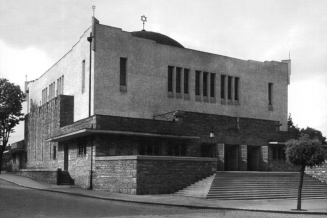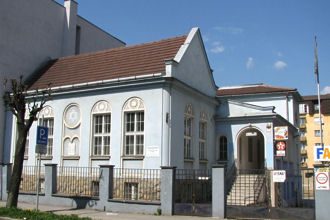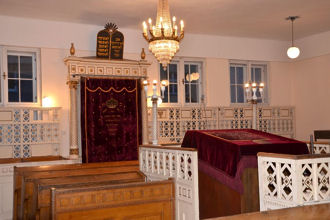Zilina between the two World Wars was a busy and teeming city. The Jew Alexander Aranyos, the author of the first Slovak tango called Dita, lived here. Women were enthralled by tenor Bercy Godstein. The first exhibition of painter Imrich Weiner-Kral, was held here. The main streets, Masarykova, Hviezdoslavova, Namestie Slobody, were lined with Jewish shops, hotels, and other firms. Families Langfelder, Spanyol, Ring, Braun, Vogel, Schlesinger, Hersch, Scheer, and many others meant something! There were also poor Jews here, like Katz, Elias, and so on. Jewish elementary school (zidovska ludova skola) was very popular. Children of many non Jewish families were enrolled in it, owing to the high quality of education. Jews did not segregate themselves from other inhabitants, they did not live in some kind of social or spiritual ghetto, thereby significantly contributing to the multicultural status of the city.
Jews, who saw in October 1938 the Czechoslovak flag thrown down from the Financial Palace, and in its place the Slovak flag hoisted, felt, that something bad was brewing. This feeling had, unfortunately, been fulfilled.
Slovak autonomy was declared in our city on 6 October 1938. Jews of Zilina were apprehensive, but, most of them, as did Jews all over Slovakia, lived in illusions. In years to come they kept believing, that the relevant anti Jewish measure was the last one, that the government wouldn’t aggravate the situation, which was, indeed, serious one, but what would be, would be. Slight, deprivation and discrimination had been their lot for centuries, they got used to it. Even at the time of transports, when their very life was at stake, the bearers of different kinds of exemption clauses (vynimky) believed, they would be saved. Vain were the efforts of Jews to accommodate themselves, to make agreements with those, who had no intention to agree upon anything. Anti-Jewish hatred at the time of autonomy was ablaze, but the time of methodical measures was yet to come.
The Slovak state came into being on 14 March 1939. A stream of regulations, rules, and public notices was issued. It gradually restricted and deprived the Jews of their civic and commercial rights, excluding them from individual spheres of life. Jewish municipal employees had been relieved of their jobs by 1 January 1940. Many were those, who craved for Jewish property. There were 756 merchants in the city, out of them 424 Jewish ones, who had trading licence. A stage had been set for wholesale robbery. District Aryanization Committee had been set up. One of Aryanized companies was the well-known hotel Remi. In years 1941-1942, 414 Jewish enterprises in Zilina had been liquidated, while others were aryanized. Jewish houses (some 260 in Zilina) gradually became the state property. Jews, sent to transport, were allowed only 50 kg per person. Their real property was sold at auctions.
Additional statutory rules had not only caused aggravation of discrimination of Jews. They led also to destitution and isolation of said Jews, who not only were to become redundant, they were turned into a burden, which was to be rid off. Jewish children were thrown out of schools, Jewish employees were thrown out of work. Jews were forbidden, prior to 10 a.m., to go to Zilina marketplace, visit parks, cafes, restaurants, and cinemas. On September 1941, so called Jewish Codex was issued. It instructed all Jews to wear a six pointed Star of David.
Membership in the organization called Ustredna Zidov (Jewish Central) was compulsory. Its Zilina branch organized retraining courses, supposed to provide young people with necessary skills for work in handicraft and agriculture. It should facilitate their job seeking in Slovakia, or more precisely, to prepare them for their future life in Palestine. However, most course participants had died during the holocaust. There was a collective retraining group in Zilina, various handicraft courses, horticultural group in Banova, too. Jewish work centres were active here, whereby Zilina Jews toiled also at Hiadel, Jalna, etc. Some of them, at least temporarily, were saved in work centres.
| …previous page |







